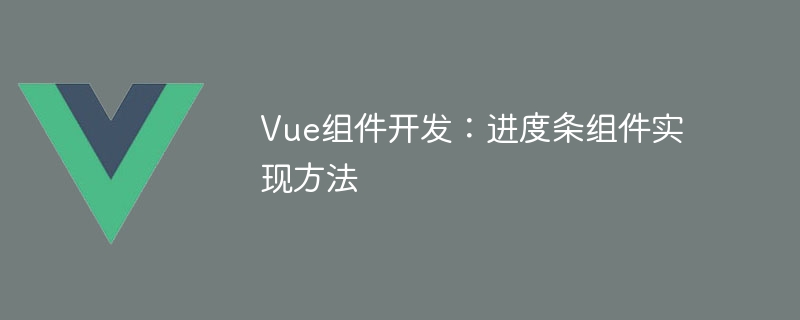

Vue component development: Progress bar component implementation method
Foreword:
In Web development, the progress bar is a common UI component. , file upload, form submission and other scenarios are often used to display the progress of operations. In Vue.js, we can easily implement a progress bar component by customizing components. This article will introduce an implementation method and provide specific code examples. I hope it will be helpful to Vue.js beginners.
<template>
<div class="progress-bar">
<div class="progress" :style="{width: progress + '%'}"></div>
</div>
</template>
<style>
.progress-bar {
width: 100%;
height: 20px;
background-color: #f1f1f1;
}
.progress {
height: 100%;
background-color: #42b983;
}
</style><script>
export default {
props: {
progress: {
type: Number,
default: 0
}
}
}
</script><template>
<div>
<progress-bar :progress="progress"></progress-bar>
<button @click="start">开始</button>
<button @click="reset">重置</button>
</div>
</template>
<script>
import ProgressBar from './ProgressBar.vue'
export default {
components: {
ProgressBar
},
data() {
return {
progress: 0
}
},
methods: {
start() {
this.progress = 0;
this.timer = setInterval(() => {
this.progress += 10;
if (this.progress >= 100) {
clearInterval(this.timer);
}
}, 1000);
},
reset() {
this.progress = 0;
clearInterval(this.timer);
}
}
}
</script>Then, in the main component of the Vue application, introduce the progress bar component and define a progress attribute in the data attribute to represent the current progress. Through the click event of the button, we can change the progress value of the progress bar to achieve the dynamic effect of the progress bar.
Finally, render the main component to the root node of the Vue application, and run the application to see the progress bar effect.
Summary:
Through the above steps, we have introduced in detail how to use Vue.js to develop a progress bar component. By defining the structure and style of the component, and using property and data binding, we can easily implement a powerful progress bar component. I hope this article will be helpful to developers who are learning Vue.js.
The above is the detailed content of Vue component development: implementation method of progress bar component. For more information, please follow other related articles on the PHP Chinese website!